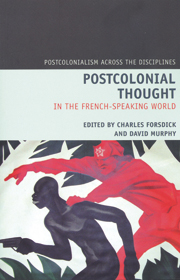Book contents
- Frontmatter
- Contents
- Acknowledgements
- Introduction: Situating Francophone Postcolonial Thought
- Section 1 Twelve Key Thinkers
- Section 2 Themes, Approaches, Theories
- 13 Postcolonial Anthropology in the French-speaking World
- 14 French Theory and the Exotic
- 15 The End of the Ancien Régime French Empire
- 16 The End of the Republican Empire (1918–62)
- 17 Postcolonialism and Deconstruction: The Francophone Connection
- 18 Negritude, Présence Africaine, Race
- 19 Francophone Island Cultures: Comparing Discourses of Identity in ‘Is-land’ Literatures
- 20 Locating Quebec on the Postcolonial Map
- 21 Diversity and Difference in Postcolonial France
- 22 Colonialism, Postcolonialism and the Cultures of Commemoration
- 23 Gender and Empire in the World of Film
- 24 From Colonial to Postcolonial: Reflections on the Colonial Debate in France
- Notes on Contributors
- Bibliography
- Index
16 - The End of the Republican Empire (1918–62)
from Section 2 - Themes, Approaches, Theories
- Frontmatter
- Contents
- Acknowledgements
- Introduction: Situating Francophone Postcolonial Thought
- Section 1 Twelve Key Thinkers
- Section 2 Themes, Approaches, Theories
- 13 Postcolonial Anthropology in the French-speaking World
- 14 French Theory and the Exotic
- 15 The End of the Ancien Régime French Empire
- 16 The End of the Republican Empire (1918–62)
- 17 Postcolonialism and Deconstruction: The Francophone Connection
- 18 Negritude, Présence Africaine, Race
- 19 Francophone Island Cultures: Comparing Discourses of Identity in ‘Is-land’ Literatures
- 20 Locating Quebec on the Postcolonial Map
- 21 Diversity and Difference in Postcolonial France
- 22 Colonialism, Postcolonialism and the Cultures of Commemoration
- 23 Gender and Empire in the World of Film
- 24 From Colonial to Postcolonial: Reflections on the Colonial Debate in France
- Notes on Contributors
- Bibliography
- Index
Summary
The paradoxical empire
Although it spanned the long century from the Algiers Expedition of 1830 to Algerian independence in 1962, and covered an area only surpassed by the British Empire, France's modern colonial edifice was, throughout its existence, built on sand. This weakness was both structural and conceptual:
Small islands and extensive continental land masses, the territorial possessions of France were found all around the world, yet were so scattered, so disparate in environment and culture, that they could hardly become the empire en bloc that imperialists urged that they be at the end of the nineteenth century. ‘Empire’ was a verbal convenience, perhaps a shibboleth uttered to conjure up what was not there.
(Betts, 1991: 10)This lack of territorial integrity was exacerbated by an evident failure of imperial will. For the French colonial enterprise was only ever the preoccupation of a relatively small group of activists, with the great majority of the metropolitan population disinclined to invest their savings, still less their lives, in la France d'outre-mer [Overseas France]. Such imperial reluctance is underlined by the emergence, even before the First World War, of significant opposition to colonialism, including the socialist leader Jean Jaurès and the celebrated novelist Anatole France. Nevertheless, between 1918 and at least 1945, a broad if essentially tacit consensus may plausibly be said to have existed in favour of France's self-appointed ‘civilizing mission’ – an imperial vocation celebrated in spectacular fashion by the 1930 Algerian Centenary and the 1931 Paris Colonial Exhibition.
- Type
- Chapter
- Information
- Postcolonial Thought in the French Speaking World , pp. 205 - 215Publisher: Liverpool University PressPrint publication year: 2009



